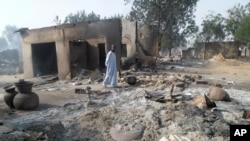At the mention of violent extremism, groups like al Qa’ida and ISIL, and regions like the Middle East usually come to mind. But according to Sarah Sewall, Under Secretary for Civilian Security, Democracy, and Human Rights, violent extremism is on the rise in Africa – in East Africa, West Africa, the Sahel and the Maghreb. The terrorists often try to justify their depravity with religion.
“Many violent extremists harness religious claims to cloak their depravity and inspire followers. Sadly, acts of violence in the name of religion are as old as religion itself, and they persist in communities around the world, from so-called honor killings to wife-burnings.
Lately we are seeing a new, highly dangerous trend, said Under Secretary Sewall: the rise of organized, heavily armed, non-state actors that justify violence and territorial ambitions with religious ideologies. Groups including al-Shabaab, Boko Haram, al-Qai’da in the Maghreb, and the LRA—the Lord’s Resistance Army--threaten Africa’s every achievement and aspiration.
“For Africa’s future – and for global security – they must be defeated,” said Under Secretary Sewall.
Across the African continent, the United States trains and equips foreign militaries, shares intelligence, and supports police to improve border security. These are well-known elements of our counterterrorism approach in Africa. But we must also attend to the other part of the equation-- preventing the next generation of threat from emerging. We do this through our Countering Violent Extremism effort, or CVE.
CVE stresses the importance of good governance and the engagement of civil society, particularly community and religious leaders, as well as strengthening ties between governments and the communities they serve.
In the last two years, the U.S. government has helped lead a shift toward this more localized and preventive approach to violent extremism in Africa and around the world. At the global level, we are helping governments, international NGOs, and multilateral bodies establish counter-messaging centers, develop CVE strategies, engage civil society, and share best practices.
The U.S. government has also helped establish networks of researchers, young people, and municipal leaders to support each other in the shared struggle against violent extremism.
“The damage wrought by violent extremists measures not only in the blood they spill, but the investments they deter, the textbooks they burn, the women and girls they enslave, the vast human potential they squander,” said Under Secretary Sewall.“This is a struggle for the future of countless communities across Africa.”














